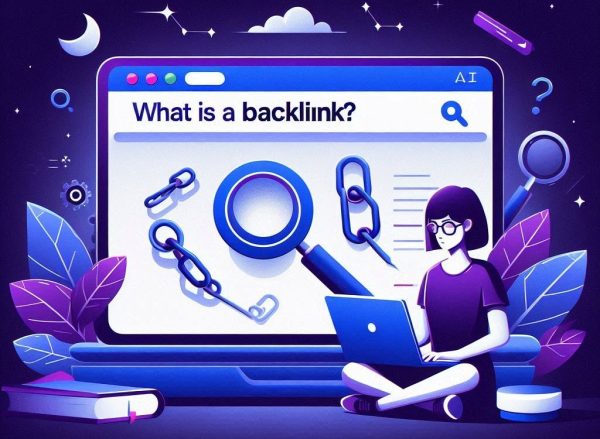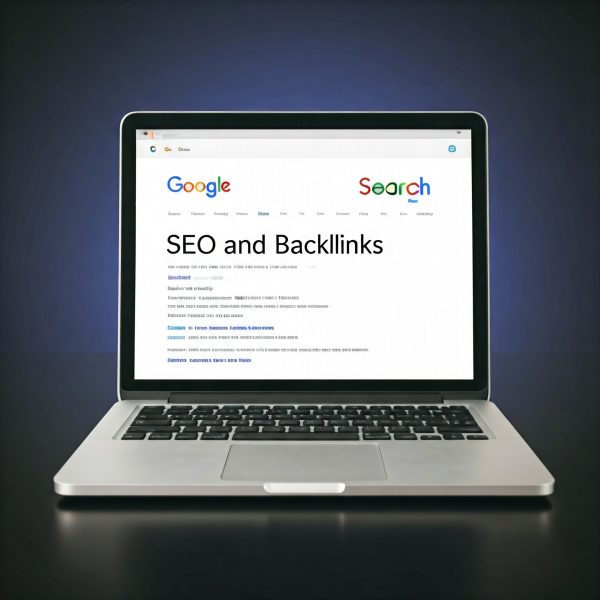In response to the question of what is a backlink? It should be said: Backlinks or return links are links that are referred to your website from another website. These links are one of the important factors in Search Engine Optimization (SEO)
Getting good backlinks requires high-quality content that brings real traffic and learning to readers. So don’t just focus on published posts, focus on building meaningful connections with other websites in your industry. In the following article, we will explore some of the methods of getting backlinks and analyze them while finding a suitable answer to the question “What is a backlink?”.
فهرست مطالب
ToggleWhat is a backlink? How to Build Backlinks from Blog Comments?
Blog comments were an old way to build backlinks, but using them incorrectly can actually hurt your website instead of helping improve SEO.
Incorrect Use of Blog Comments
When blog comments are used solely to get irrelevant backlinks, this is known as link fraud. This is a clear violation of Google’s guidelines and may result in your site being penalized. Therefore, commenting aimlessly and irrelevantly not only does not help improve your SEO, but also reduces the credibility of your website.
Use blog comments correctly
If you want to use blog comments to build backlinks, you should pay attention to these points:
- Comment relevance: Make sure your comment is relevant to the topic of the blog post and adds value to the discussion.
- Organic structure: Your comment should be natural and non-promotional, and contribute to the main topic of the post instead of focusing on linking.
- Choosing reputable websites: Only comment on blogs that are reputable, relevant to your field of work, and have high domain authority.
- Attracting positive attention: Your comment should be constructive and provide useful information so that other users Encourage them to click on your link.

What are paid backlinks?
Paid backlinks are links that you pay money or other value to obtain. While this method may seem attractive in the short term, buying backlinks is against Google’s guidelines and can have many negative consequences for your website.
Google’s view on paid backlinks
From Google’s perspective, buying links is a subset of link fraud. This method includes the following:
- Paying money for links: Buying links from websites or blogs.
- Exchanging goods or services: Offering free products or services in exchange for receiving a backlink.
- Paid posts: Publishing articles that contain paid links.
Google can easily identify websites that participate in these activities using advanced algorithms. Such websites may suffer algorithmic penalties that can severely reduce their rankings.
Why are paid backlinks worth little?
- Distrust of search engines: Paid backlinks usually come from irrelevant or low-reputation websites that provide no real value to users.
- Violation of Google principles: Buying backlinks is directly against Google’s webmaster guidelines and can result in a penalty.
- Short-term impact: Even if they initially improve your rankings, once Google detects them, all your efforts will be in vain.
What are Social Bookmarking Backlinks?
Social bookmarking was an old way to save and share links to web pages. In this method, users saved links they wanted to keep for later use or sharing on social bookmarking sites. These links were usually publicly categorized with tags and displayed in related groups or networks.
In the past, webmasters benefited from increased traffic by placing links to their sites on these platforms. But with Google’s algorithm changes, the value of these links decreased.
Google’s view on socially bookmarked backlinks
John Mueller, a senior analyst at Google, said in response to a question about social bookmarking sites:

“I don’t think these pages have any impact on your ranking. We ignore links from these sites. This is an old approach in SEO and we have a lot of experience in identifying and ignoring these types of links.”
In other words, Google considers links created from social bookmarking sites to be worthless and have no impact on improving your site’s ranking.
Building Social Backlinks Bookmarked
Today, social bookmarking links do not have a significant impact on SEO due to their lack of followability and low value. This old method has been replaced by more modern and effective methods.
Google has identified this method as an old and low-value technique and ignores the impact of its links on rankings. To improve SEO, it is better to focus on organic methods and effective strategies to establish a strong and lasting connection with your audience.
What is an exchanged backlink?
Exchanged backlinks or reciprocal links are created when two webmasters agree to link to each other’s websites. The main purpose of this exchange is mutual exploitation to improve the ranking and traffic of the sites. While this may seem like a positive SEO strategy at first glance, Google classifies this type of link building as a form of link fraud and considers it a clear violation of its webmaster guidelines.
Google’s View on Exchanged Backlinks
Google has explicitly stated that excessive use of exchanged links (in the form of “link me, I’ll link you”) or the creation of pages specifically for exchanging links is prohibited. Such actions are known as search engine manipulation and can lead to algorithmic penalties or a reduction in the site’s ranking in Google’s search engine.

Dangers of reciprocal links
- Penalty risk: Websites that participate in this type of exchange are at risk of being penalized by Google.
- Reduced site authority: Reciprocal links have little SEO value and negatively affect the authority of your website.
- Unnatural links: This type of link building often looks unnatural and is easily detected by Google’s algorithms.
Why should you avoid exchanging backlinks?
Building reciprocal backlinks is against Google’s guidelines. If you use this method incorrectly, your efforts will be considered search engine optimization. Instead, focus on healthy, organic strategies.
What are directory backlinks?
Directory backlinks, also known as directory links, are online listings or categories of websites and businesses. In the past, these links were an important tool for building backlinks and coordinating your contact information (NAP). But today, using low-quality links from these pages can result in a penalty from Google.
Google’s view on directory backlinks
With the advancement of Google’s algorithms, links from low-quality directories have very little impact on rankings. Google analyst John Mueller has emphasized that network links from directory directories usually do not help improve SEO or rankings. Google also warns against using these directories for link building.
How to build directory backlinks?
- Choose authoritative directories: Instead of using low-quality pages, use authoritative directories that provide accurate and useful information to users.
- Contact information consistency (NAP): Make sure your business information is correctly and consistently registered in these directories.
- Avoid mass link building: Using directories to build links increases the risk of a site being penalized.

What are Private Blog Network (PBN) Backlinks?
A Private Blog Network (PBN) is a group of sites that are created with the purpose of generating backlinks for a specific site. These networks are privately managed and try to leave no trace. However, PBN links are known as a risky link scam due to their manipulative and deceptive methods.
Google’s View on PBN Backlinks
In the past, it was difficult for Google to identify PBN links, but with the advancement of technology, Google can easily identify these links. If your site uses PBNs for link building, you may lose your ranking and face heavy penalties.
Why should we avoid PBNs?
- Google Penalties: Using PBNs is against Google’s webmaster guidelines and is easily detected.
- High Risk: Link building using PBNs jeopardizes the site’s ranking and may nullify all your efforts.
- Unethical: This method is known as an unethical technique in SEO.
What are self-generated backlinks?

Self-generated backlinks refer to links that are created using automated software. Tools like Web Effector and SEO Hammer are programmed as bots that insert links into comments, forums, and posts using specific keywords to target websites. This method may provide positive results in the short term, but Google will quickly identify these links and penalize the site in question.
Google’s view on self-created backlinks
Google strongly discourages self-created backlinks and recommends avoiding any automated link building software or services. According to Google guidelines, this type of link building is known as link fraud and is a direct violation of webmaster policies.
Building Self-Created Backlinks
Creating self-created backlinks is against Google guidelines and not only reduces the quality of the Internet content but also risks penalizing the website. To succeed in SEO, you should avoid these risky methods and focus on natural link building.
What are widget backlinks?
Widgets are pieces of code that are used to improve the user experience on websites. These tools are usually designed in the form of plugins, resources, or features such as displaying the weather and calculators. In the past, embedding links in widgets was a common way to get backlinks.
Google’s view on widget backlinks
Google officially explained this type of backlinks in a 2016 article by Google Webmasters:

“Some widgets add links to sites that webmasters have no control over. These links usually include keywords and are hidden or poorly placed in the widgets. Because these links are placed unnaturally, Google considers them a violation of webmaster guidelines.”
Building widget backlinks
Using widgets as a link building method is a bad strategy that can lead to your website being penalized. To avoid problems:
- Manage the links in widgets. If you have widgets that contain unnatural links, remove them or add the nofollow attribute to these links.
- Don’t use widgets for link building. Google will easily detect these methods and may penalize your site for violating the guidelines.
Concluding Remarks
In the article above, we first answered the question of what is a backlink? and then listed a number of different methods that are no longer a suitable solution for improving SEO. These methods are not only less valuable, but also carry the risk of being penalized website also comes with it. Focus on natural methods, creating quality content, and collaborating with reputable sites to improve your site’s ranking because this strategy will not only improve your site’s ranking in search engines, but will also prevent potential problems.
Original publication date: 11/10/2000
Update date: 10/29/2003





